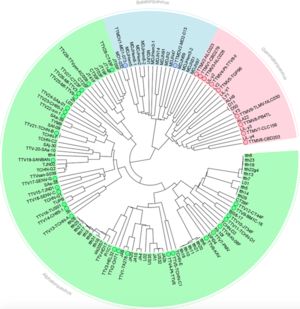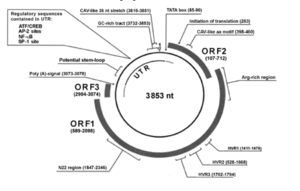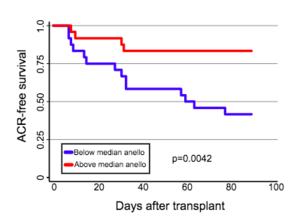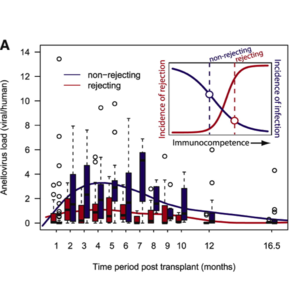Anellovirus
Introduction

By Julia Josowitz
Anelloviruses are a broad and diverse family of single-strand DNA viruses that are prevalent in humans and animals. Despite their prevalence, they are not known to be pathogenic, but have been found to correlate with many diseases. They have been shown to correlate with immune competence, which presents an interesting opportunity to use the viral loads as a diagnostic to predict risk of opportunistic infections or transplant rejection.
Other examples:
Bold
Italic
Subscript: H2O
Superscript: Fe3+
Overview
Anelloviruses are small, circular viruses found in blood plasma. They are single stranded and negative-sense DNA viruses. While they are not known to cause any harm, high viral loads are associated with immune suppression and diseases such as hepatitis, cancer, and autoimmune diseases [3]. The first anellovirus discovered was torque teno virus (TTV) in 1997, which was initially believed to be part of the pathology of hepatitis, but since then these viruses have been found to be relatively widespread and heterogenous, with no known pathogenicity [14][17]. TTV is still used as the prototypical anellovirus for many studies today, and it is one of the most prevalent. Since their discovery, it has become clear that these viruses are very prevalent, representing about 70% of the viruses found within human blood and tissues [9].
Within the family Anelloviridae there are twelve known genera, but originally there were thought to be three prototypical genera: Alphatorquevirus, Betatorquevirus, and Gammatorquevirus. Alphatorquevirus includes TTV, while Betatorquevirus includes torque teno mini virus (TTMV) and Gammatorquevirus includes torque teno midi virus (TTMDV). The high mutation rates and diversity have led to high-throughput sequencing categorizing the virus into more genera [4]. These viruses have also been found in cats, dogs, and even pigs and bats. Anelloviruses are very prevalent in humans, with more than 80% of the population infected, and appear to establish persistent infections that remain within the body for the rest of the human life. As mentioned previously, they are also very diverse, with at least 41 different species infecting humans as of 2012 [6]. Despite this diversity, TTV-8 is currently thought to be the most prevalent anellovirus in humans [8]. Although these viruses remain in the body after infection and infect such a large part of the population, their mechanisms of evading the host immune system are unknown. However, their prevalence suggests an almost commensal relationship with their hosts.

Anelloviruses are unenveloped viruses that have a capsid made of 12 pentameric capsomers. With microscopy, it appears to be a spherical particle and it has icosahedral symmetry typical of many viruses [12]. There is no evidence of a lipid envelope. Virion particle sizes vary between genera, with a range from 30 to 50 nm for TTV, but less than 30 nm for TTMV. The crystal structure of TTV has not been solved and these viruses cannot be grown in vitro due to lack of compatible cell systems. It is believed that these viruses replicate within the bone marrow and liver of humans, because double stranded replicative intermediates have been found in these tissues, indicating that the single-stranded virus is using the host machinery to replicate. Anelloviruses reside within peripheral blood mononuclear cells, and recent studies have suggested that under certain conditions, the virus may also be able to replicate within these cells [18].
While the main transmission route is believed to be blood, there is evidence of multiple other routes of transmission. Because anelloviruses are present in pharyngeal mucus, it has been suggested that they are also disseminated via coughing or sneezing. This could help explain how they are so prevalent, as the virus could spread via droplets. Anelloviruses are present in the fecal matter of infected organisms and have been detected in sewage water, as well as in some meat products, which suggests an oral route of transmission. These viruses have been found in high numbers in the cervical epithelium, suggesting that they might be transmitted through sexual contact. It is possible that viruses are transmitted from mother to offspring, as the viruses have been found in amniotic fluid and umbilical cord blood, and the newborn viral genotype usually resembles the mother. This could also help explain the prevalence of the viruses in populations. However, it is also possible that newborns become infected early in life simply through contact with the mother [17]. Because these viruses are prevalent in both animals and humans, it has been suggested that new genera of anelloviruses could arise due to anthropozoonosis, the transmission of pathogens from humans to animals or vice versa [4].
In addition to the prevalence of these viruses in the human population, they have been found to correlate with many diseases, such as hepatitis, HIV, cancer, asthma, and other autoimmune disorders. Patients with both hepatitis and TTV have higher mortality rates than those with hepatitis alone, but to date there is no evidence that the anellovirus contributes to the disease progression. Despite the higher mortality rates, there is no histopathological evidence that co-infection with TTV affects the liver in a different way than hepatitis alone. While TTV has also been detected in neoplastic tissues, it is unclear whether it contributes to cancer progression. While there is little evidence to support it yet, it has been suggested that the small anellovirus DNA fragments found in human serum could be pathogenic, like geminiviruses in plants [11].However, due to the prevalence of these viruses, it is difficult to determine whether they are truly pathogenic and more research must be done to determine their role.
Genome
The anellovirus genome is made of a circular single stranded DNA molecule that has a GC rich region of 117 nucleotides. Genome size varies based on the host, but the TTV genome ranges from 3.6 to 3.9 kilobases [12]. Of this, there is a 1.2 kb untranslated region and a 2.6 kb coding region. The untranslated region has been highly conserved, suggesting that it likely plays a role in viral replication. Interestingly, the coding region has two large open reading frames, the first of which encodes a 770 amino acid residue protein and another that encodes a slightly smaller peptide in TTV. These reading frames vary between isolates of the virus. The viral genome produces three viral proteins, of which two have known isoforms. The largest viral protein, ORF1, likely encodes the capsid, but the function of the other two is unknown [16]. Anellovirus is hypothesized to replicate using the rolling-circle method.
The genome of anellovirus is very heterogenous, with high divergence. Of the human TTVs in the genus Alphatorquevirus, there were at least 29 known species as of 2015, with more than 40 different genotypes. More specifically, ORF1, which encodes a viral protein, has very high variability with three regions that often experience insertions or deletions, increasing the variability between viruses [12]. Different genotypes can infect the same host at the same time, even within the same tissue. Researchers hypothesize that this may be due to a high mutation rate in TTV. This is uncommon for DNA viruses, which use the host’s own replicative machinery, making them less error-prone and the chance of mistakes more unlikely. However, research in single stranded DNA viruses such as parvoviruses has found that the single stranded nature of the genome and its ability to encode replication proteins may account for high rates of mutation. Thus, this could explain the high rates of mutation in anelloviruses.
Recently, it has also been proposed that intra-genomic recombination could account for the heterogeneity of the Anellovirus genome. It has been suggested that TTV has co-evolved with the host for over millions of years, allowing for great variability. However, this same variability makes phylogenetic analysis difficult, as will be discussed later.
Finally, the transmission of these viruses between humans and animals could also contribute to the high variability.
Potential interactions with the immune system
Other DNA viruses are known to stimulate immune cells to produce inflammatory cytokines, so Rocchi et al. studied whether TTVs could also have a direct effect on immune system signaling [15]. More specifically, they tested whether TTV DNA alone could have effects on the immune system. They used lipofectin, which incorporates DNA and protects it from nucleases, to simulate a viral capsid. Spleen cells were treated with lipofectin coupled with TTV DNA, which resulted in an increase in inflammatory cytokines. These results suggest that TTV DNA can directly activate transcription of inflammatory genes within target cells. Inhibitors were used to determine through which receptor TTV DNA was able to change host transcription. Toll-like receptor 9 was found to be the main mediator of the TTV DNA interaction.
Anelloviruses have also been suggested to modulate the host immune system using micro RNAs (miRNAs). miRNAs are small noncoding RNAs (around 22 nucleotides) that play a role in posttranscriptional gene regulation. Viruses from the herpesvirus and retrovirus families have been found to encode viral miRNAs, and these viruses are also characterized by the ability to establish a persistent infection in their host, much like anelloviruses. Using computer simulations and synthetic techniques, Kincaid et al. was able to demonstrate anelloviruses likely encode viral miRNAs. It has also been suggested that viral miRNAs may play a role in immune evasion [10].
Kincaid et al. developed computational methods to predict the possibility of miRNAs from the primary sequence of genes. Their modeling predicted multiple miRNAs encoded by TTVs, and by engineering recombinant TTVs capable of expressing an RNA transgene in addition to the miRNA, they were able to identify a potential target of the viral miRNA, the gene N-myc interactor (NMI). NMI is a gene that modulates interferon and cytokine signaling. It is stimulated by interferon and has previously been associated with viral induced apoptosis. The authors suggest that the TTV miRNA helps the virus modulate the immune system by targeting NMI to inhibit interferon and promote immune evasion. This could help explain how these viruses are so persistent in the human body and avoid immune clearance. However, while strong possible miRNA candidates were observed in all five groups of human TTVs, none were observed in TTMDVs or TTMVs.
Research has also sought to identify the role of the proteins encoded by the viral genome. In a study of swine anelloviruses, it was found that the large viral protein produced by anelloviruses, termed ORF1, down-regulated type I interferon production, which is a common mechanism by which viruses are able to establish chronic infections. They also observed that ORF1 initially increased production of inflammatory cytokines after infection, while another viral protein, ORF2, did not. The ORF1 protein also appears to use mechanisms utilized by other viruses to suppress and evade the immune system. For example, SOCS-1 and PD-1 suppress T-cell responses, and thus are upregulated by both herpes simplex virus and the hepatitis C core protein. ORF1 up-regulated both of these proteins six hours post infection [16].
ORF2, another viral protein encoded by anelloviruses, has been shown to suppress NFκB, which is necessary for expression of inflammatory genes such as IL-6 and IL-8. Additionally, replication intermediates of anelloviruses can stimulate the immune system. Specifically, heterodimers of guanosine and cytosine, which are not present in mammalian DNA, can be detected by toll-like receptor 9 and either stimulate or inhibit production of inflammatory cytokines .
Correlation with transplant outcomes
Recent research suggests that anellovirus loads could be used as a predictor of transplant outcomes. High levels of anellovirus are associated with immune suppression, while low levels are correlated with immunocompetence. It had previously been found that lung transplant patients had increased anellovirus levels in their bronchoalveolar fluid and in their serum (Young et al.). Additionally, low plasma anellovirus loads have been found to be associated with acute rejection in heart transplant recipients. This makes anelloviruses a potential marker of chronic rejection, as low plasma anellovirus levels may suggest later rejection.
Blatter et al. investigated the impact of both alphatorqueviruses and betatorqueviruses on the outcome of lung transplants in a pediatric cohort of 57 children. They hypothesized that high levels of anellovirus in the blood would be associated with lower levels of rejection and an overall better outcome. Additionally, they predicted that different genera of anellovirus might be associated with different outcomes, as previous research found that alphatorqueviruses correlated with fever in children but betatorqueviruses did not.
Blatter et al. found that alphatorquevirus levels were higher than betatorquevirus levels in all of the patients, but the load of each increased over the course of the study, which lasted 18 months post transplant. They found that low alphatorquevirus load were associated with acute rejection, while low betatorquevirus levels were correlated with negative long term outcomes, such as death or retransplant. Similar results were found previously by De Vlaminck et al., who observed that from 1 to 16.5 months post-transplant, patients with rejecting outcomes consistently had a lower anellovirus load than non-rejecting patients. Blatter et al. also found distinct phylogenetic clusters of anelloviruses in patients pre-transplant and in controls when compared to post-transplant patients. It is still unclear whether anelloviruses directly interact with the immune system, but this study suggests that anellovirus load can still be a useful biomarker for prediction of transplant outcomes. Additionally, as discussed above, there is evidence that anelloviruses may be able to indirectly effect the immune system via miRNAs.
Interestingly, it appears that while anellovirus loads increase post-transplant and higher loads are correlated with better transplant outcomes, in general anellovirus load correlates with immunosuppression. As a result, it has also been found to correlate with the progression of AIDS in HIV-infected patients. Thom and Petrik found that patients with AIDS consistently had higher anellovirus loads than HIV positive and negative patients. They also found an inverse relationship between the levels of CD4 T cells and anellovirus loads, suggesting that higher viral loads promote immunosuppression.
In patients receiving high dose chemotherapy coupled with autologous stem cell transplantation, an increase in anellovirus load is observed post treatment. Additionally, this increase correlated with an increase in CD8+ T cells, which can help fight cancer. Anelloviral loads returned to baseline around 100 days post transplant, and the authors used this to hypothesize about when patients have returned to immunocompetent status. Anellovirus loads offer an opportunity for clinicans to make informed decisions about when their patients will have the best outcomes for transplants (Focosi et al.).
Conclusion
Overall paper length should be 3,000 words, with at least 3 figures.
References
Edited by Julia Josowitz of Joan Slonczewski for BIOL 238 Microbiology, 2018, Kenyon College.


